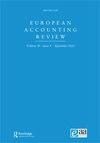政府什么时候“黑暗”?不确定时期政府信息披露选择的实证研究
IF 2.7
3区 管理学
Q2 BUSINESS, FINANCE
引用次数: 0
摘要
摘要本文研究了不确定性冲击对财政指导水平的影响。财政指导是政府对财政和经济前景的预期演变所发布的指导。由于不确定性使政府的预期不那么精确,但对用户来说可能更有价值,我们假设披露困境导致政府在更高的指导需求和更高的发布不准确预测的可能性之间取得平衡。在我们的样本中使用自然灾害随机化不确定性冲击,我们发现平均而言,政府在不确定时期发布的指导较少。这种影响是由对资产负债表项目未来演变的预测数量减少所驱动的,但只有在政府的再融资需求较低、债券市场相对平静的情况下才会出现这种情况。相反,在不确定时期保持稳定指导水平的政府,似乎是在迎合来自债权人的强制性同构压力。我们进一步证明,政府在不确定时期的相对“透明度”与财政报告质量指标呈负相关。总的来说,证据表明,在公共部门,不确定性导致披露数量和质量之间的权衡。本文章由计算机程序翻译,如有差异,请以英文原文为准。
When do Governments ‘Go Dark'? Evidence on Governments’ Disclosure Choices in Periods of Uncertainty
ABSTRACT We examine the effect of uncertainty shocks on the level of fiscal guidance – the guidance issued by governments on the expected evolution of the fiscal and economic outlook. Because uncertainty makes governments’ expectations less precise but potentially more valuable to users, we hypothesize that a disclosure dilemma leads governments to balance a higher demand for guidance with a higher probability of issuing inaccurate forecasts. Using natural disasters to randomize uncertainty shocks in our sample, we find that on average, governments issue less guidance in periods of uncertainty. The effect is driven by a reduction in the number of forecasts on the future evolution of balance sheet items, but only when governments have low refinancing needs and face a relatively quiet bond market. Instead, governments that maintain a stable level of guidance in periods of uncertainty appear to cater to coercive isomorphic pressures stemming from creditors. We further document that the relative ‘transparency’ of governments in periods of uncertainty is negatively related to indicators of fiscal reporting quality. Collectively, the evidence indicates that in the public sector, uncertainty leads to a trade-off between disclosure quantity and quality.
求助全文
通过发布文献求助,成功后即可免费获取论文全文。
去求助
来源期刊

European Accounting Review
BUSINESS, FINANCE-
CiteScore
7.00
自引率
6.10%
发文量
58
期刊介绍:
Devoted to the advancement of accounting knowledge, it provides a forum for the publication of high quality accounting research manuscripts. The journal acknowledges its European origins and the distinctive variety of the European accounting research community. Conscious of these origins, European Accounting Review emphasises openness and flexibility, not only regarding the substantive issues of accounting research, but also with respect to paradigms, methodologies and styles of conducting that research. Though European Accounting Review is a truly international journal, it also holds a unique position as it is the only accounting journal to provide a European forum for the reporting of accounting research.
 求助内容:
求助内容: 应助结果提醒方式:
应助结果提醒方式:


